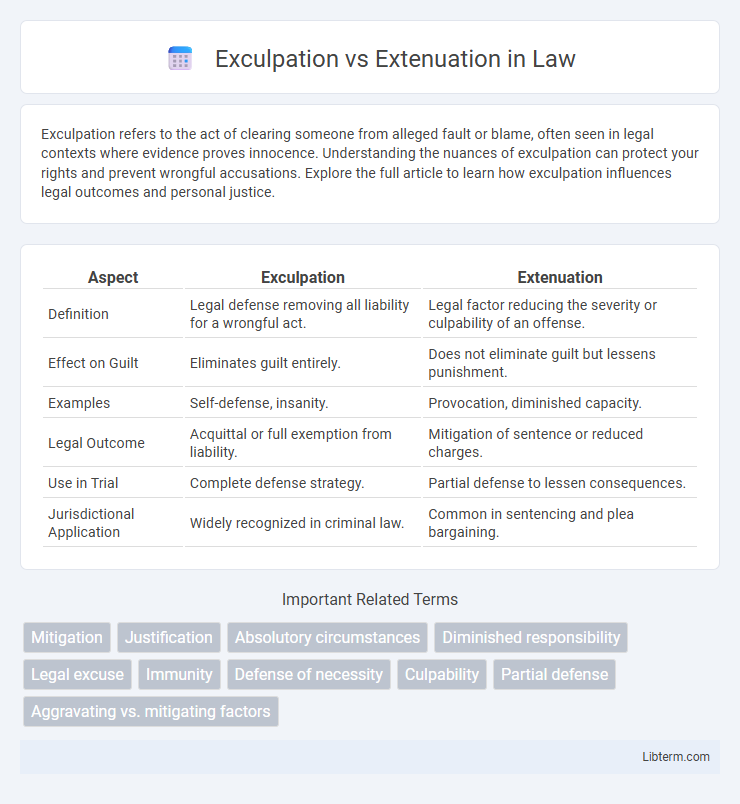Exculpation refers to the act of clearing someone from alleged fault or blame, often seen in legal contexts where evidence proves innocence. Understanding the nuances of exculpation can protect your rights and prevent wrongful accusations. Explore the full article to learn how exculpation influences legal outcomes and personal justice.
Table of Comparison
| Aspect | Exculpation | Extenuation |
|---|---|---|
| Definition | Legal defense removing all liability for a wrongful act. | Legal factor reducing the severity or culpability of an offense. |
| Effect on Guilt | Eliminates guilt entirely. | Does not eliminate guilt but lessens punishment. |
| Examples | Self-defense, insanity. | Provocation, diminished capacity. |
| Legal Outcome | Acquittal or full exemption from liability. | Mitigation of sentence or reduced charges. |
| Use in Trial | Complete defense strategy. | Partial defense to lessen consequences. |
| Jurisdictional Application | Widely recognized in criminal law. | Common in sentencing and plea bargaining. |
Understanding Exculpation: Definition and Scope
Exculpation refers to the legal or moral act of clearing someone from blame or fault by proving their innocence or lack of responsibility in a particular situation. It involves demonstrating facts or evidence that absolve the individual from alleged wrongdoing, distinguishing it from extenuation, which only lessens the severity or culpability but does not absolve. Understanding exculpation hinges on its scope in law where it functions to entirely remove liability, impacting judgments and legal proceedings by establishing non-involvement or justification.
What Is Extenuation? A Clear Explanation
Extenuation refers to circumstances or factors that lessen the severity or culpability of a wrongful act without completely absolving the offender of responsibility. It involves mitigating conditions such as provocation, diminished capacity, or acting under duress that reduce moral blameworthiness in legal and ethical contexts. Unlike exculpation, which fully excuses or absolves an individual from guilt, extenuation acknowledges fault but argues for a reduced degree of liability or punishment.
Key Differences Between Exculpation and Extenuation
Exculpation refers to evidence or arguments that completely absolve a defendant from guilt, proving innocence or lack of responsibility for a crime. Extenuation involves factors that mitigate the severity or culpability of a criminal act without fully absolving the offender, often leading to reduced charges or lighter sentences. The key difference lies in exculpation eliminating culpability, while extenuation acknowledges guilt but provides justification for lesser punishment.
Legal Context: How Courts Apply Exculpation
In legal contexts, courts apply exculpation to clear a defendant of wrongdoing by establishing the absence of criminal intent or proving an alibi that absolves liability. Exculpatory evidence, such as video footage or witness testimony, plays a critical role in demonstrating innocence and preventing wrongful conviction. This contrasts with extenuation, which acknowledges guilt but seeks to lessen punishment by highlighting mitigating circumstances like diminished capacity or coercion.
The Role of Extenuation in Criminal Cases
Extenuation in criminal cases serves to lessen the perceived severity of the defendant's actions by presenting mitigating factors such as duress, lack of intent, or mental incapacity. Unlike exculpation, which aims to prove innocence outright, extenuation acknowledges wrongdoing while seeking reduced liability or sentencing. Courts often weigh extenuating circumstances carefully to determine appropriate punishment levels within the framework of criminal law.
Common Examples of Exculpation in Law
Exculpation in law refers to evidence or facts that clear a defendant from blame or guilt by proving innocence, such as alibi testimony proving the defendant was elsewhere during the crime, or DNA evidence excluding the suspect at the crime scene. Common examples include self-defense claims that justify actions otherwise deemed criminal, and mistakes of fact where a defendant unknowingly committed an act without criminal intent. These exculpatory instances contrast with extenuation, which mitigates but does not eliminate legal responsibility or blame.
Illustrative Cases Highlighting Extenuation
Extenuation refers to circumstances that reduce the severity or culpability of a criminal act, often resulting in lesser sentences, as seen in cases like mitigating mental illness or extreme emotional distress during the offense. For instance, in People v. Smith, the defendant's diminished capacity due to chronic PTSD was recognized as a significant extenuating factor, leading to a reduction from first-degree to second-degree murder charges. Such illustrative cases highlight how extenuation influences judicial discretion by acknowledging factors that partially excuse the defendant's conduct without fully absolving liability.
Exculpation vs Extenuation: Semantic Nuances
Exculpation involves providing evidence or arguments that completely absolve a defendant from blame or guilt, emphasizing the removal of liability in legal contexts. Extenuation refers to presenting circumstances or factors that partially mitigate responsibility, reducing the severity of judgment without fully eliminating accountability. The semantic nuance lies in exculpation's total vindication contrasted with extenuation's partial justification or excuse.
Importance of These Defenses in Legal Proceedings
Exculpation and extenuation serve critical roles in legal proceedings by influencing the determination of liability and sentencing. Exculpation provides evidence or arguments that completely absolve a defendant of guilt, while extenuation offers mitigating factors that reduce culpability without negating responsibility. These defenses are essential for ensuring just outcomes by either preventing wrongful convictions or moderating punishment based on circumstances surrounding the offense.
Choosing the Right Defense: Exculpation or Extenuation?
Choosing the right defense between exculpation and extenuation hinges on the defendant's circumstances and available evidence. Exculpation aims to prove innocence by negating elements of the crime, while extenuation acknowledges guilt but seeks reduced culpability through mitigating factors like mental state or coercion. Legal strategies must carefully evaluate case specifics, as exculpation can lead to acquittal, whereas extenuation often results in lesser sentencing.
Exculpation Infographic

 libterm.com
libterm.com